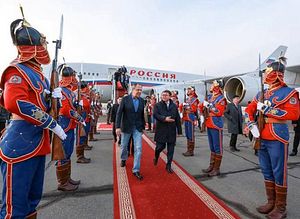Long-haul flights are a degrading experience. We’ve all been among the stooping, unshaven, red-eyed passengers emerging to unfamiliar sunlight in the state of semi-stupor. To make life a little easier I always follow CNN’s travel advice and wear comfortable blue jeans. But I travel in the economy class. Maybe if I had my own airplane, I’d make the point, just before landing, of changing into something more respectable — especially if I were the foreign minister of Russia, Sergey Lavrov, arriving in Mongolia to a red-carpet welcome.
Oversights. Omissions. Stubborn little details. In the age of the social media, they are blown out of all proportion, so you’d think people would pay more attention. You’d expect that Lavrov, a man of “formidable talents,” according to a recent assessment in Foreign Policy, would have enough tact and experience to recognize, as he landed in the aptly-named Chinggis (Genghis) Khaan International Airport on April 14, that he should not wear jeans in the presence of a menacing Mongolian warrior honor guard in faux imperial uniforms.
Images proliferated, as did expressions of outrage. Political commentator and People’s Party politician B. Tsogtgerel summed up the prevailing sentiment: “Wearing clothes that one would wear at home when fixing the plumbing, is to snub, to disrespect, in a word, to insult. Lavrov’s jeans have become a manifestation of Mongolian international prestige.” Lavrov’s subsequent effort to undo the damage – he turned up impeccably dressed for a meeting with the Mongolian President Ts. Elbegdorj, with whom he sniffed ceremonial tobacco in a show of cultural sensitivity – did little to restore the foreign minister’s standing in the eyes of public opinion. Although the visit may have become an important stepping stone towards a deeper Russo-Mongolian engagement, the wider Mongolian public won’t remember and won’t care. They will remember the snub.
The Mongolians live in the past, cherishing memories of Genghis Khan’s great empire, when Mongolia was the superpower of Eurasia. Eight hundred years later, Genghis’ proud progeny are on the whole a poor lot, ever dependent on their two powerful neighbors, China and Russia. For this reason, perhaps, the Mongolians are hypersensitive to slight. They are ever on the lookout for signs of bullying and disrespect, interpreting even the most innocent oversight as deliberate humiliation. Lavrov should have known better.
He should have known, for instance, that when Ts. Elbegdorj turned up in Moscow in May 2015 for the anniversary of Russia’s victory in the World War II, Mongolian commentators were all up in arms about the fact that he was seated too far from Vladimir Putin at the military parade.
He should have remembered the embarrassing highlight of Chinese President Xi Jinping’s August 2014 visit to Mongolia, when Xi, in an apparent show of respect, quoted a famous poem by D. Natsagdorj: “This, this is my native land, / The lovely country; My Mongolia.” Oh, good grief – what can go wrong when you cite a famous Mongolian poem? The Chinese protocol officials should have pondered the sensitivities, for the Mongolia social media reaction was one of outrage for Xi Jinping daring to call Mongolia the land where he was born. (Hidden irredentism, no doubt!)
Finally, Lavrov could have learned from U.S. President Barack Obama’s unhappy experience back in September 2011, when Obama, in a group photo, waved his hand, covering Elbegdorj’s face. Obama, perhaps, would hardly remember the episode, but in Mongolia his negligence is still perceived as the deepest of insults.
Little things matter, especially in a fiercely nationalistic, immensely proud nation like Mongolia. Dealing with the Mongolians requires constant attention to minor details, to ceremony, to protocol. And even then, one can never be sure one’s actions won’t be misconstrued as a hidden insult or a hideous plot. If there is one lesson that Lavrov’s little misadventure in Mongolia suggests, it is that of the immense importance of respecting one’s neighbors. For Russia, as for any other great power that has habitually dominated and coerced its neighbors, such lessons will take time to sink in.
Sergey Radchenko is Professor of International Relations at Cardiff University and Global Fellow at the Woodrow Wilson Center for International Scholars.

































